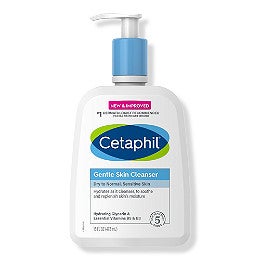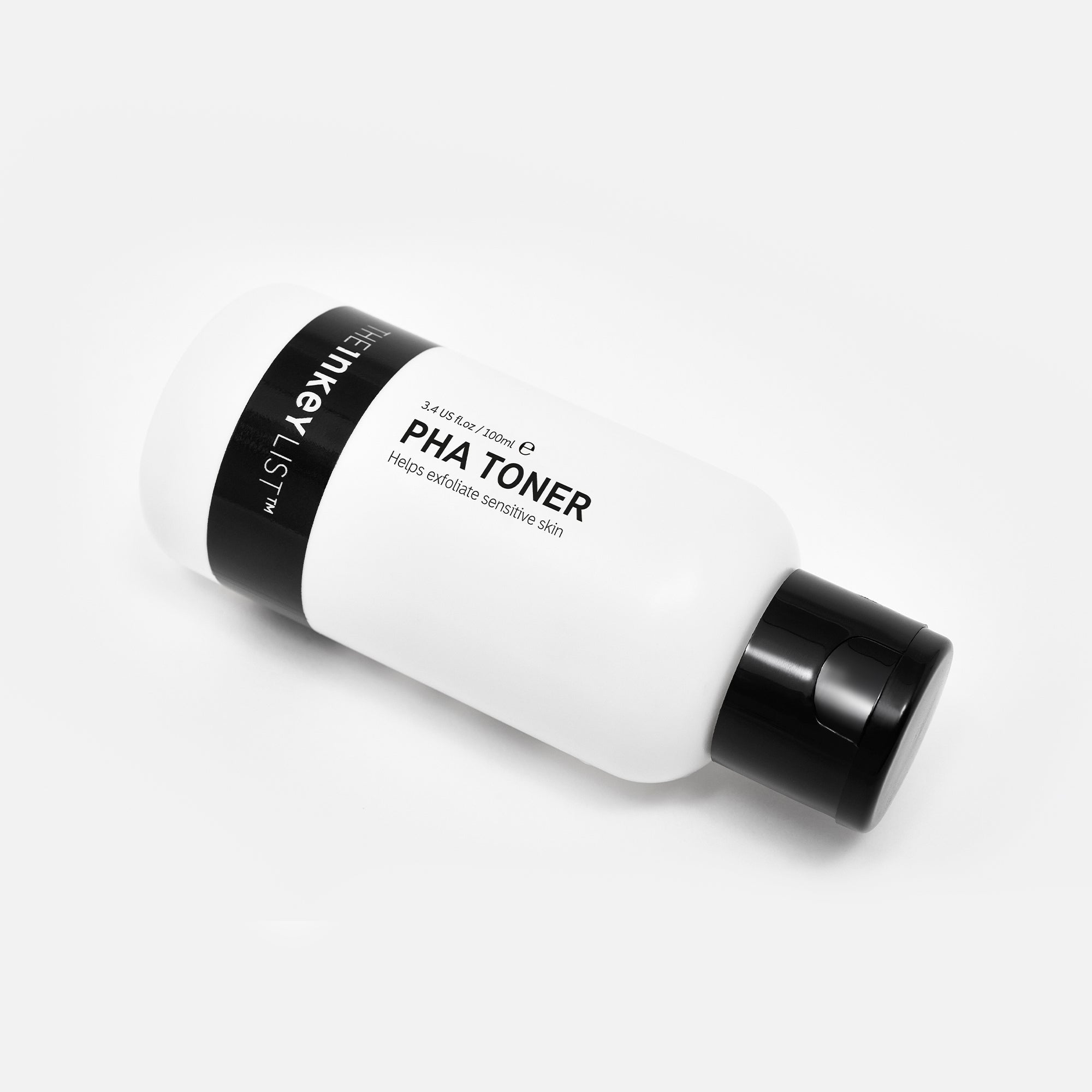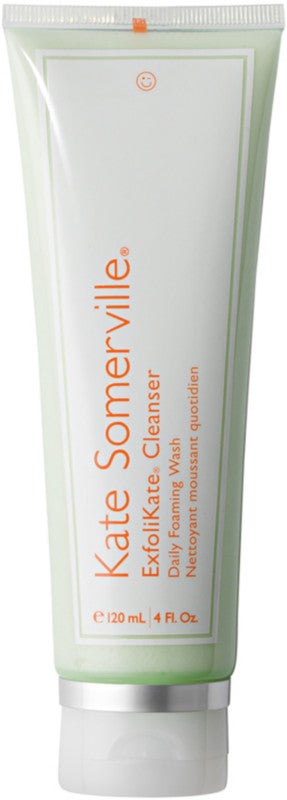Not too long ago, you could ask any skincare expert which product or ingredient they'd recommend for glowing skin and nine times out of ten their answer would be some kind of exfoliating acid. Whether you see yourself as a skincare aficionado, a novice, or somewhere in between, you've no doubt used — or at least heard of — one of them. Pixi's Glow Tonic and Glossier's Solution are just two of the many cult products you may have seen in an influencer's #shelfie. The two most common acids are: glycolic acid (known to help with skin pigmentation) and salicylic acid (for keeping blackheads and breakouts in check). With the promise of clear, smooth and radiant skin, it's no wonder everyone wants in on the acid action.
AdvertisementADVERTISEMENT
It's safe to say we hit peak acid during the first few months of the pandemic. Being cooped up inside left us with dull skin, while routine mask-wearing resulted in maskne. Social-media derms, on Instagram and TikTok, mentioned exfoliating acids as a fix for both concerns. Using Google data, Cult Beauty reported that salicylic acid, lactic acid, and azelaic acid were among the most-searched skincare ingredients in 2020, while LookFantastic reported The Ordinary's AHA Peeling Solution (a combination of five potent acids) as its most sought-after skincare product of 2021. Two weeks into 2022, however, a handful of skin experts are doing a 180 when it comes to using acids in skincare, with some pros warning their clients away from them entirely.
The dangers of using skincare acids incorrectly
Aesthetician Alicia Lartey recently took to Instagram Stories to share her thoughts on brands offering 'daily' acids in skincare, suggesting they are far too strong to be used on the face every single day. She told R29 that one luxury exfoliating toner in particular (which often sells out in store and online) has been the cause of "so much stress" in her London clinic, with clients using it too often and damaging their skin barrier. She explains that over-exfoliating is very common and can exacerbate acne and other inflammatory skin conditions. "A telltale sign you're over-exfoliating using acids is dry skin that can have a film-like appearance," she says. "You may also experience some flaking around the nose and mouth, and in lighter skin tones, obvious signs of redness." Alicia says she has seen some clients whose skin is so dry and tight as a result of over-exfoliating that it flakes off at the touch. She blames this on the way some brands market acid-based products, for example as, "safe for everyday use." In reality, this might not be the best, or safest advice, for your skin.
AdvertisementADVERTISEMENT
Alicia isn't the only professional to lament the extreme use of acids in skincare. "Exfoliating acids are falling out of favor," confirms facialist and natural-skincare expert Lisa Harris. "I think this is because they are overused. Some are too much of an irritant for skin. For example, glycolic acid can be very aggressive, causing a lot of skin damage." If not used properly, or if used too much (as is often the case, report Alicia and Lisa), your skin could be in trouble. "When this happens, the skin is stripped of its natural sebum, or oil, and can cause damage to the pH balance," says Lisa. This can present as clogged pores or very dry skin, to pinpoint just a couple of gripes.
Consultant dermatologist Dr. Justine Kluk believes acids, when incorporated carefully into a skincare regime of the right person, promote smoother, brighter skin. But she confirms: "Because the touted benefits are appealing, recent popularity has led to overzealous and sometimes inappropriate use, with some users experiencing irritant contact dermatitis." This is a type of eczema that can result in red, dry, and itchy skin. With the benefits of acids including an evening in skin tone and texture, and an enviable glow, you'd be forgiven for reaching for them every time you apply your skincare. But it isn't just the frequency that can harm skin — it's how we're combining our acid-based products with our other skincare that can be an issue, too.
AdvertisementADVERTISEMENT
"Nobody needs a 10-step skincare routine," says Dr. Kluk, who advocates simple skincare. "When combined with other active ingredients, such as retinol, using multiple different acids in your routine — introducing products too rapidly, or using them too frequently — can lead to an impaired skin barrier and increased skin sensitivity. This might result in dryness, redness, roughness, flaking, soreness, tightness, itching and reduced tolerance of your other usual skincare." That sting you experience when applying products? It's a sign you've upset your skin barrier — and it's something Alicia has seen a lot in her clinic recently, as clients overdo it on exfoliating acids.
Though irritating, contact dermatitis or increased breakouts might be the least of your worries. Not long ago a woman went viral for an alarming skin reaction to The Ordinary's AHA Peeling Solution. She reported that her skin was "oozing, swelling, and burning" and was left peeling and with multiple scabs. Adored by a handful of skin experts and always front and center in influencer TikToks, the exfoliating product contains a very-high concentration of acids — 30% to be exact. A trip to A&E confirmed the woman's irritation to be a chemical burn, which can potentially cause scarring. It can happen to anyone, too. People are taking to TikTok, sharing how they damaged their skin barrier using too many acids at once. Lisa says that such damage caused by exfoliating acids can last up to three months and can strip the skin of all its nutrients and hydration.
AdvertisementADVERTISEMENT
The trouble with layering acids
Still, acids — including high-strength versions — are available over the counter and remain popular, especially among skincare enthusiasts online. Dr. Kluk says that the abundance of information that we can access on the internet or on social media can be overwhelming. "Opinions are often conflicting and many influencers are providing anecdotal remedies with no formal experience, expertise, or training in managing skin health. This situation leaves people to cobble together snippets of advice and draw their own conclusions, and the results are often less than desirable." The exfoliating facial toner that worked for your favorite beauty blogger could have unpleasant side effects on your skin, for example. Lisa agrees and explains that the wealth of information online regarding exfoliating acids (especially layering and mixing them) is causing more harm than good. "This is because people are using them without realizing the power they have and the damage they can do," she tells R29. "Layering should only be done with acids that are prescribed by a skin specialist."
Alicia believes skincare brands are to blame for many acid-induced skin problems. "There are so many different acids on the market and some brands tell people to use their products every day, while others recommend once a week. It's really hard for people to have a clear understanding of how to balance a skincare routine. I always say that any brand that sells you an acid using words like 'daily' will also sell you a barrier-repair serum to counteract the effects." Dr. Kluk also calls for clear guidance from brands, including how much product to use, how to introduce the product gradually, giving advice on who might not be suitable for the product (e.g. if you have a skin condition or sensitive skin), and which other products could be avoided when using acids. If in doubt, always refer to an aesthetician or dermatologist.
AdvertisementADVERTISEMENT
What to do if you've damaged your skin with acids
Dr. Kluk says the skincare conversation now begs the question: How we can be more gentle with our product choices? She suggests reducing or stopping the exfoliating acids altogether if you're experiencing irritation. "This will give your skin barrier a chance to recover," she says. "It may feel like a bit of a setback, but it doesn't mean that you have to give up on your skin goals. It just means you've got to be smart and make your basics work better for you."
Now, there's more emphasis on protecting — rather than attacking — the skin barrier, continues Dr. Kluk, who recommends starting off your routine with a non-stripping cleanser. "If smooth, radiant skin is what you are aiming for, the Cetaphil Gentle Skin Cleanser is a great, affordable option, as it's fragrance-free, non-comedogenic, so less likely to clog your pores, and suitable for sensitive skin types. I'd also recommend moisturizing daily to help protect and strengthen the skin barrier." She recommends Cetaphil's Healthy Radiance Day Cream (with SPF 30) in the morning, and the Healthy Radiance Renewing Cream in the evening. A broad-spectrum SPF 30 or 50 is a must in the daytime, particularly if you're using any kind of exfoliating acid (even the lowest concentrations).
How to implement acids safely
If you're still sold on exfoliating, it pays to get your ingredients right. Dr. Kluk and Alicia recommend investing in skincare with poly hydroxy acids (PHAs), which are a little gentler on the skin as compared to alpha hydroxy acids (AHAs), such as glycolic acid, but still exfoliate the skin. R29 loves The Inkey List's PHA Toner, or Medik8 Press & Glow Tonic, both of which can be layered underneath moisturizer. The key is to introduce exfoliating acids into your routine gradually, once or twice a week, only at night. Alicia is a big fan of azelaic acid, too. "This is great for pigmentation, breakouts and uneven skin texture — and it tends to be on the more gentle side."
AdvertisementADVERTISEMENT
Lisa recommends using gentle alternatives to high-strength exfoliating acids, like fruit enzymes. "These are a great alternative," she says. "They dissolve dead skin cells and don't disrupt the skin. They are also more gentle on sensitive and acne-prone skin." Try Kate Somerville's Exfolikate Cleanser Daily Foaming Wash, or Dr.Jart+'s Cicapair Tiger Grass Enzyme Cleansing Foam, both of which remove makeup and oil, but are kind on skin. Lisa sometimes adds half a teaspoon of baking soda to an enzyme cleanser to help remove dead skin cells.
The expert consensus: Acids certainly have their place in skincare, but it's important to use them correctly. If your beauty budget doesn't cover visiting a skin expert or a dermatologist for advice, there is an abundance of helpful and trustworthy platforms to check out. On Instagram, consultant dermatologist Dr. Anjali Mahto frequently posts comprehensible explainers and takes part in live skincare Q+As. Dija Ayodele, skin expert and founder of Westroom Aesthetics, recently published her debut book Black Skin, which has a handful of great tips on using acids safely, while Alicia's no-holds-barred approach to skincare on Instagram is supportive and refreshing. When it comes to using acids, the general rule of thumb is to start small (lower concentrations are best at first) and go slowly. Your skin will thank you for it.
This story was originally published on Refinery29 UK.
Refinery29's selection is purely editorial and independently chosen – we only feature items we love! As part of our business model we do work with affiliates; if you directly purchase something from a link on this article, we may earn a small amount of commission. Transparency is important to us at Refinery29, if you have any questions please reach out to us.
AdvertisementADVERTISEMENT









